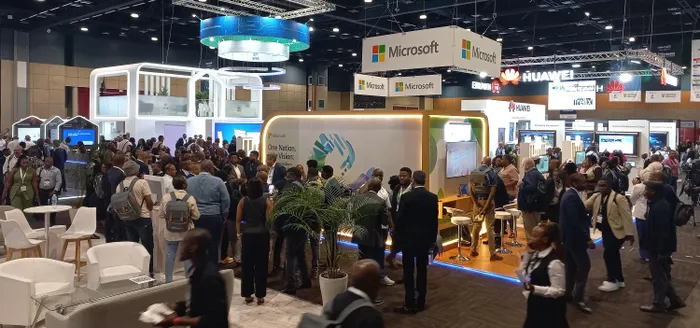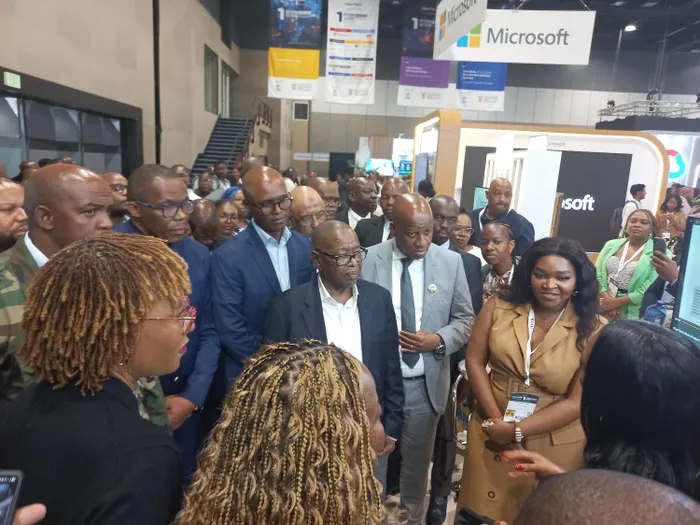GovTech sets the stage for South Africa’s digital government revolution

Leaders at the GovTech conference are committed to developing a transformative digital governance model for South Africa.
Image: Thobeka Ngema
The GovTech, conference hosted by the State Information Technology Agency (SITA) at the Inkosi Albert Luthuli International Convention Centre in the eThekwini Municipality, focuses on redefining the relationship between government and citizens in a swiftly evolving digital era.
Communications and Digital Technologies Minister Solly Malatsi, on Monday laid the groundwork in his opening address, articulating the Government of National Unity’s Medium-Term Development Plan.
He identified three central priorities for the government’s term: driving inclusive growth and job creation, reducing poverty while tackling the soaring cost of living, and cultivating a capable, ethical, and developmental state.
- Driving inclusive growth and job creation
Malatsi said it could lower the barriers to market entry by making business registration, licensing and regulatory compliance easier and cheaper. It enables innovation by opening opportunities for small enterprises and entrepreneurs to access markets and to scale their solutions to reach broader audiences. It reduces the cost of doing business by streamlining processes and cutting red tape – allowing businesses to spend more time on creating value, rather than spending time on compliance.
“Digital government also creates entirely new job pathways – in software development, digital services, data analysis and ICT infrastructure. We cannot underestimate government’s role in stimulating the digital economy,” Malatsi said.
- Reducing poverty and tackling the high cost of living
Malatsi explained that digital platforms make service delivery more efficient and cost-effective. Citizens spend less time and money travelling to government offices, and more time focusing on their livelihoods and generating income.
“Better data sharing between departments and entities reduces duplication and wastage, saving taxpayers’ money. And by using traceable, transparent digital systems in government expenditure, digital government can give citizens the confidence that resources are used fairly and efficiently,” Malatsi said.
- Building a capable, ethical and developmental state
Malatsi said it must be acknowledged that there is a significant trust deficit between the government and its stakeholders.
“Digital systems can strengthen accountability and rebuild that public trust. By creating audit trails and reducing opportunities for corruption and plundering of state resources, we can assure citizens that we are acting in their best interests,” Malatsi said.
“Data interoperability does not only save money, it allows better decision-making in government – both at the macro and individual level. When departments and entities share information, we address the siloed approach to governance, which means we can all work toward the same goals.”

Delegates, including eThekwini Municipality Mayor Cyril Xaba, Communications and Digital Technologies Minister Solly Malatsi, Science, Technology and Innovation Minister Professor Blade Nzimande and KwaZulu-Natal Premier Thamsanqa Ntuli, listen to one of the exhibitors at the GovTech conference.
Image: Thobeka Ngema
Science, Technology and Innovation Minister Professor Blade Nzimande spoke on three issues he believed are worth considering.
“The first is the far-reaching impact of technology on our daily lives. Over the last 50 years or so, we have seen the emergence of a number of technologies that have transformed our world in ways even exceeding our most optimistic expectations,” Nzimande said.
“The second issue I wish to reflect on are the challenges of digital transformation. Many countries in the developing world are struggling to address their national priorities due to problems such as the slow, uneven and discordant adoption of new technologies, which often leads to disjointed or weakened capacity for data collection, storage, processing and applications.
“The third and final issue I wish to reflect on is the need for our country to develop the necessary scientific knowledge for the development of innovative technologies that can drive digital transformation and economic inclusion.”
SITA acting managing director Gopal Reddy said: “We’ve developed a framework that delivers fully functional government apps in just 30 days, including tools for AI-driven support, contract management, and queue handling. We’re enabling real-time tracking of learners throughout their educational journey, with instant updates for parents. We’re enhancing productivity with secure tools for document collaboration, approvals, and task management. And finally, we’re introducing an AI-powered assistant that supports public servants with speechwriting, planning, reporting, and spreadsheet coaching.”
KwaZulu-Natal Premier Thamsanqa Ntuli said digital technologies and innovation are not only enablers of efficiency - they are fundamental to advancing human development and building an inclusive knowledge society.